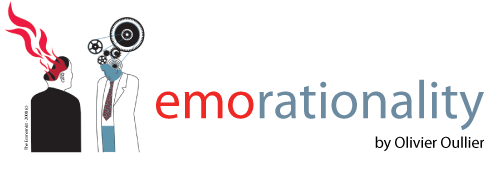At the end of April, I was invited to speak at Yale University at "The power of disruptive ideas" conference. The conference was an intense two-day exchange on various topics ranging from fractals to astronomy, finance, psychology etc. I loved it.
It was good to finally attend talks by (and sometimes have the opportunity to chat with) Robert Shiller, Benoit Mandelbrot, Peter Salovey, Michael Cappello and Laurie Santos. On day one, I participated to a panel discussion on neuroeconomics with Shane Frederick, Keith Chen and Laurie.
Laurie's work on how monkeys behave and make decisions in economic settings is remarkable (click here to visit her website), I hope you can take a couple of minutes to watch her recent talk at TED Global.
Laurie Santos is an associate professor of psychology at Yale University and the director of Yale's Comparative Cognition Lab. With her colleagues, they have trained monkeys to use a currency and buy things, make some economic decisions etc. This is remarkable work as it allows to study how a close species make decisions without being biaised by all the things we have invented to make our lives less simple (stock markets, advertising, pastis, etc...).
The only thing I would add to the list of dumb things humans can achieve, that Laurie mentions in here TED talk is that we are so far the only species that has been able to think about, create and use a weapon that can destroy our own species. If this is not a proof of intelligence ... No rabbit or monkey can do that. Right?
If you are interested in social cognition experiments with monkeys, you can also check the work of at least four other groups that I know of (but I am not a specialist, hence I apologize to other people investigating this field so please let me know of your work so that I can udpate this post).
Joël Fagot at the Cognitive Psychology Lab (UMR 6146) of the University of Provence & CNRS is the head of a unique facility (click here to see a video) where monkeys are not only trained to participate to experiments but can choose the moment when to participate. Click here for more information about Joel's work and here to read a pdf version of his most recent work (co-authored with Elodie Bonté) on automated testing procedures of cognitive performance in monkeys.
In 2007, I came across the work of Keith Jensen, a lecturer at Queen Mary University of London, thanks to the paper he and his colleagues published in Science. Entitled "Chimpanzees are rational maximizers in an Ultimatum Game", the study shows how when monkeys play an adapted version of the Ultimatum Game (very clever experimental setup, see below). The chimps behave more like homo oeconomici than humans (click here for a pdf version, and here for a summary on the Natural Rationality blog).
I particulary like the last statement of the paper "one of humans’ closest living relatives behaves according to traditional economic models of self-interest, unlike humans [...] this species does not share the human sensitivity to fairness" (p. 109). Another paper from this group that I enjoyed is "Chimpanzee are vengeful but not spiteful" published in 2007 in PNAS (clik here to read).
Joan Silk, a professor of anthrolpology at UCLA Department of Anthropology responded to Jensen and colleagues' PNAS paper the same year. She authored "Chimps don't just get mad, they get even" (click here to read). Silk is interested in (among other topics) the origins of prosocial behavior. According to her website (click here to visit), she is "interested in questions that explicitly link studies of nonhuman primates to humans, attempting to probe the phylogenetic roots of capacities that play a crucial role in human societies, such as reconciliation, cooperation, friendship, cooperative signals, paternal investment, and the origins of prosocial sentiments". For her list of publications and downloadable papers click here.
Finally, still in 2007, I read a very interesting paper reporting for the first time that "chimpanzees do exhibit an endowment effect, by favoring items they just received more than their preferred items that could be acquired through exchange. Moreover, the effect is stronger for food than for less evolutionarily salient objects, perhaps because of historically greater risks associated with keeping a valuable item versus attempting to exchange it for another" (Current Biology, 2007, 17(19), 1704-1707, click here for the pdf version of the article). This paper is authored by Sarah Brosnan, an assistant professor in the Department of Psychology at Georgia State University. She is the Comparative Economics and Behavioral Studies Laboratory (CEBUS Lab) where she conducts research on nonhuman primates (click here to visit her website and here to access her list of publications and downloadable papers).
That's it for monkeynomics today (or whatever this is called). This line of research is very interesting and provides a great perspective on what we are, do, etc. Please send me more references.
PS: Back to the conference that allowed me to meet Laurie Santos and therefore motivated this post : Congrats to the IJ team (Ted, Thierry, Gareth, Micha, et al.) for organizing such a great event at Yale.
